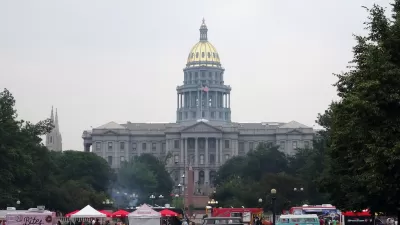In a letter to city officials, a law firm called on the city to lift restrictions on food trucks, saying the ban “smacks of protectionism” and could violate equal protection guarantees.

A nonprofit law firm is warning Denver officials that the city’s ban on food trucks in the Lower Downtown district could be unconstitutional, according to an article by Joe Rubino in the Denver Post. “The Institute for Justice, a Virginia-based, nonprofit law firm, sent a letter to Denver City Council members on Wednesday urging the “repeal” of the ban that bars food trucks from portions LoDo on Thursday, Friday and Saturday nights.” As the article notes, the city clarified that the ban only applies on Friday and Saturday.
“The firm’s lawyers argue the Denver ban ‘smacks of protectionism’ because businesses with permanent storefronts aren’t subject to the same rules. The letter also points to previous Institute for Justice research that indicates food trucks enhance public safety by making streets more inviting and providing more eyes and ears.”
According to the letter, the firm, which has “sued numerous jurisdictions whose laws have impermissibly restricted vendors’ right to economic liberty as guaranteed by the U.S. Constitution and the respective state constitutions,” also works with local governments to “craft vending laws that ensure the public’s health and safety while maximizing opportunities for vendors and consumers alike.”
The Denver Police Department and the Department of Transportation and Infrastructure instituted the ban in July, citing security concerns, but is now considering rolling back the ban “in a limited fashion.”
FULL STORY: Denver’s LoDo food truck ban is likely unconstitutional, law firm warns city leaders

Alabama: Trump Terminates Settlements for Black Communities Harmed By Raw Sewage
Trump deemed the landmark civil rights agreement “illegal DEI and environmental justice policy.”

Planetizen Federal Action Tracker
A weekly monitor of how Trump’s orders and actions are impacting planners and planning in America.

The 120 Year Old Tiny Home Villages That Sheltered San Francisco’s Earthquake Refugees
More than a century ago, San Francisco mobilized to house thousands of residents displaced by the 1906 earthquake. Could their strategy offer a model for the present?

In Both Crashes and Crime, Public Transportation is Far Safer than Driving
Contrary to popular assumptions, public transportation has far lower crash and crime rates than automobile travel. For safer communities, improve and encourage transit travel.

Report: Zoning Reforms Should Complement Nashville’s Ambitious Transit Plan
Without reform, restrictive zoning codes will limit the impact of the city’s planned transit expansion and could exclude some of the residents who depend on transit the most.

Judge Orders Release of Frozen IRA, IIJA Funding
The decision is a victory for environmental groups who charged that freezing funds for critical infrastructure and disaster response programs caused “real and irreparable harm” to communities.
Urban Design for Planners 1: Software Tools
This six-course series explores essential urban design concepts using open source software and equips planners with the tools they need to participate fully in the urban design process.
Planning for Universal Design
Learn the tools for implementing Universal Design in planning regulations.
Clanton & Associates, Inc.
Jessamine County Fiscal Court
Institute for Housing and Urban Development Studies (IHS)
City of Grandview
Harvard GSD Executive Education
Toledo-Lucas County Plan Commissions
Salt Lake City
NYU Wagner Graduate School of Public Service




























